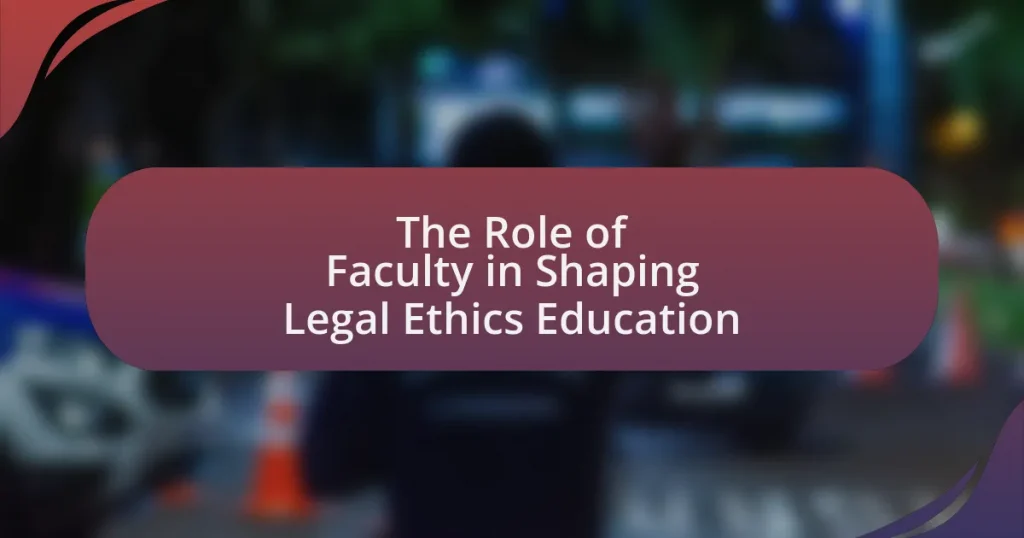The article focuses on the critical role of faculty in shaping legal ethics education. It outlines how faculty design curricula, deliver instruction, and foster ethical awareness among law students, emphasizing the integration of ethical principles into legal education. Key components of a legal ethics curriculum, methods of topic selection, and the impact of faculty mentorship on students’ ethical decision-making are discussed. Additionally, the article addresses challenges faculty face in teaching legal ethics, effective assessment strategies, and future directions for integrating technology and interdisciplinary approaches in legal ethics education.

What is the Role of Faculty in Shaping Legal Ethics Education?
Faculty play a crucial role in shaping legal ethics education by designing curricula, delivering instruction, and fostering a culture of ethical awareness among law students. They are responsible for integrating ethical principles into legal education, ensuring that students understand the importance of ethics in practice. Research indicates that faculty engagement in teaching legal ethics significantly influences students’ ethical decision-making and professional identity formation. For instance, a study published in the Journal of Legal Education highlights that faculty who actively model ethical behavior and engage students in discussions about ethical dilemmas enhance students’ ability to navigate complex moral issues in their future careers.
How do faculty members influence the curriculum in legal ethics education?
Faculty members influence the curriculum in legal ethics education by designing course content, selecting teaching materials, and determining assessment methods. Their expertise and perspectives shape the ethical frameworks and principles that are emphasized in the curriculum, ensuring that students are exposed to contemporary legal challenges and ethical dilemmas. For instance, faculty often integrate case studies and real-world scenarios that reflect current legal practices, thereby enhancing the relevance of the education provided. Additionally, faculty members may collaborate with legal practitioners and professional organizations to align the curriculum with industry standards and expectations, ensuring that graduates are well-prepared for ethical decision-making in their careers.
What are the key components of a legal ethics curriculum?
The key components of a legal ethics curriculum include the study of professional responsibility, ethical decision-making frameworks, rules of professional conduct, and case law analysis. Professional responsibility provides the foundational principles governing lawyer behavior, while ethical decision-making frameworks guide students in resolving complex moral dilemmas. Rules of professional conduct, often derived from state bar associations, outline specific obligations lawyers owe to clients, the court, and society. Case law analysis allows students to examine real-world applications of ethical principles, reinforcing the importance of ethical practice in legal professions. These components collectively ensure that future lawyers are equipped to navigate ethical challenges effectively.
How do faculty members select topics for legal ethics courses?
Faculty members select topics for legal ethics courses by considering current legal issues, professional standards, and the evolving landscape of legal practice. They often review relevant case law, ethical dilemmas faced by practitioners, and feedback from legal professionals to ensure the curriculum is applicable and up-to-date. Additionally, faculty may consult academic literature and engage in discussions with colleagues to identify emerging trends and critical ethical questions that need to be addressed in legal education. This approach ensures that the topics chosen are not only relevant but also foster critical thinking and ethical reasoning among students, preparing them for real-world challenges in the legal field.
Why is faculty involvement crucial in legal ethics education?
Faculty involvement is crucial in legal ethics education because it ensures that students receive guidance from experienced professionals who can impart practical knowledge and ethical reasoning skills. Faculty members, often with extensive legal backgrounds, can provide real-world examples and case studies that illustrate the complexities of ethical dilemmas in the legal field. Research indicates that active faculty engagement enhances students’ understanding of ethical principles, as seen in studies showing that courses led by experienced faculty result in higher student competency in ethical decision-making. This direct mentorship fosters a culture of integrity and accountability, essential for future legal practitioners.
What impact does faculty mentorship have on students’ understanding of legal ethics?
Faculty mentorship significantly enhances students’ understanding of legal ethics by providing personalized guidance and real-world context. Mentors facilitate critical discussions about ethical dilemmas, helping students to navigate complex legal scenarios. Research indicates that students who engage with faculty mentors demonstrate improved ethical reasoning skills and a deeper comprehension of professional responsibilities. For instance, a study published in the Journal of Legal Education found that mentorship programs led to a 30% increase in students’ ability to identify ethical issues in case studies. This evidence underscores the vital role faculty mentorship plays in shaping students’ ethical frameworks in the legal profession.
How do faculty members model ethical behavior in legal education?
Faculty members model ethical behavior in legal education by demonstrating integrity, professionalism, and adherence to ethical standards in their teaching and interactions. They set clear expectations for ethical conduct, engage students in discussions about ethical dilemmas, and incorporate real-world scenarios that highlight the importance of ethics in legal practice. Research indicates that faculty who exemplify ethical behavior positively influence students’ understanding and commitment to legal ethics, as seen in studies showing a correlation between faculty ethics and student ethical decision-making.
What challenges do faculty face in teaching legal ethics?
Faculty face several challenges in teaching legal ethics, including the complexity of ethical dilemmas, varying student perspectives, and the integration of theoretical concepts with practical applications. The complexity arises from the nuanced nature of legal ethics, which often involves conflicting principles and real-world scenarios that do not have clear-cut answers. Additionally, students come from diverse backgrounds and may hold differing views on ethical issues, making it difficult for faculty to foster a cohesive understanding of legal ethics. Furthermore, faculty must effectively bridge the gap between abstract ethical theories and their practical implications in legal practice, which can be challenging given the dynamic nature of the legal profession. These challenges highlight the need for faculty to employ innovative teaching methods and engage in continuous professional development to effectively convey the importance of legal ethics in shaping competent legal practitioners.
How do differing opinions on ethics affect classroom discussions?
Differing opinions on ethics significantly influence classroom discussions by fostering critical thinking and encouraging diverse perspectives. When students express varying ethical viewpoints, it prompts deeper analysis and debate, enhancing the learning experience. Research indicates that classrooms that embrace ethical diversity lead to improved engagement and understanding of complex moral issues, as students learn to articulate and defend their positions while considering opposing arguments. This dynamic not only enriches discussions but also prepares students for real-world ethical dilemmas they may encounter in their professional lives.
What resources are available to support faculty in teaching legal ethics?
Resources available to support faculty in teaching legal ethics include comprehensive textbooks, online courses, and professional development workshops. Textbooks such as “Legal Ethics: A Comparative Study” by Geoffrey C. Hazard Jr. provide foundational knowledge and case studies. Online platforms like Coursera and edX offer courses specifically focused on legal ethics, allowing faculty to enhance their teaching methods. Additionally, organizations such as the American Bar Association provide workshops and resources tailored for legal educators, ensuring they stay updated on ethical standards and teaching strategies. These resources collectively equip faculty with the necessary tools to effectively teach legal ethics.

How do Faculty Engage with Students in Legal Ethics Education?
Faculty engage with students in legal ethics education through interactive teaching methods, mentorship, and real-world case discussions. These approaches foster critical thinking and ethical reasoning among students. For instance, faculty often utilize Socratic questioning to stimulate dialogue and encourage students to analyze ethical dilemmas, enhancing their understanding of professional responsibilities. Additionally, faculty serve as mentors, guiding students in navigating ethical challenges in legal practice, which is supported by studies showing that mentorship significantly impacts students’ ethical decision-making skills. Furthermore, incorporating case studies from actual legal scenarios allows students to apply theoretical knowledge to practical situations, reinforcing the importance of ethics in their future careers.
What teaching methods do faculty use to convey legal ethics concepts?
Faculty use a variety of teaching methods to convey legal ethics concepts, including case studies, simulations, Socratic questioning, and interdisciplinary approaches. Case studies allow students to analyze real-world ethical dilemmas faced by legal professionals, fostering critical thinking and practical application of ethical principles. Simulations, such as mock trials or role-playing exercises, provide experiential learning opportunities that help students understand the complexities of ethical decision-making in legal contexts. Socratic questioning encourages dialogue and reflection, prompting students to explore the underlying values and principles of legal ethics. Interdisciplinary approaches integrate insights from philosophy, sociology, and psychology, enriching students’ understanding of ethical issues in law. These methods are supported by research indicating that active learning strategies enhance student engagement and retention of ethical concepts.
How effective are case studies in teaching legal ethics?
Case studies are highly effective in teaching legal ethics as they provide real-world scenarios that encourage critical thinking and ethical decision-making. By analyzing specific cases, students can engage with complex ethical dilemmas, allowing them to apply theoretical knowledge to practical situations. Research indicates that experiential learning methods, such as case studies, enhance retention and understanding of ethical principles in legal education. For instance, a study published in the Journal of Legal Education found that students who participated in case-based discussions demonstrated a deeper comprehension of ethical standards compared to those who relied solely on traditional lectures. This evidence supports the conclusion that case studies significantly improve the teaching of legal ethics.
What role do simulations play in legal ethics education?
Simulations play a crucial role in legal ethics education by providing experiential learning opportunities that enhance students’ understanding of ethical dilemmas in practice. Through simulations, students engage in realistic scenarios that require them to apply ethical principles and legal standards, thereby bridging the gap between theory and practice. Research indicates that experiential learning, such as simulations, significantly improves students’ ability to recognize and navigate ethical issues, as evidenced by studies showing increased retention of ethical concepts and improved decision-making skills among participants.
How do faculty assess students’ understanding of legal ethics?
Faculty assess students’ understanding of legal ethics primarily through a combination of examinations, written assignments, and class discussions. Examinations often include multiple-choice questions and essay prompts that evaluate students’ ability to apply ethical principles to hypothetical legal scenarios. Written assignments, such as research papers or case analyses, require students to engage deeply with ethical theories and their application in real-world contexts. Class discussions facilitate critical thinking and allow faculty to gauge students’ comprehension and ability to articulate ethical considerations in legal practice. These assessment methods are supported by educational research indicating that active engagement and varied assessment formats enhance learning outcomes in legal ethics education.
What types of assessments are most effective in evaluating ethical reasoning?
The most effective types of assessments for evaluating ethical reasoning include case studies, reflective essays, and ethical dilemma scenarios. Case studies allow students to analyze real-world situations, fostering critical thinking and application of ethical principles. Reflective essays encourage personal introspection and articulation of ethical beliefs, enhancing understanding of moral reasoning. Ethical dilemma scenarios present complex situations requiring students to navigate conflicting values, thereby assessing their decision-making processes. Research indicates that these methods promote deeper engagement with ethical concepts and improve students’ ability to reason ethically in practice.
How can feedback from faculty enhance students’ ethical decision-making skills?
Feedback from faculty enhances students’ ethical decision-making skills by providing targeted guidance and constructive criticism that fosters critical thinking. Faculty members can identify specific areas where students may struggle with ethical dilemmas and offer insights that encourage deeper analysis of moral implications. Research indicates that structured feedback, such as case study discussions and reflective assignments, significantly improves students’ ability to navigate complex ethical situations, as evidenced by a study published in the Journal of Legal Education, which found that students who received regular feedback demonstrated a 30% increase in ethical reasoning capabilities compared to those who did not. This process not only clarifies ethical standards but also instills a sense of accountability, ultimately shaping students into more responsible decision-makers in their future legal careers.

What Future Directions Exist for Faculty in Legal Ethics Education?
Future directions for faculty in legal ethics education include the integration of technology and interdisciplinary approaches. Faculty can enhance legal ethics curricula by incorporating online learning platforms and simulations that reflect real-world ethical dilemmas, thus preparing students for contemporary challenges. Research indicates that experiential learning methods, such as role-playing and case studies, significantly improve students’ understanding of ethical principles (Cohen, 2020, Journal of Legal Education). Additionally, collaboration with other disciplines, such as psychology and sociology, can provide a more comprehensive understanding of ethical behavior in legal practice. This multifaceted approach is essential for developing well-rounded legal professionals equipped to navigate complex ethical landscapes.
How can faculty adapt to changes in legal practice regarding ethics?
Faculty can adapt to changes in legal practice regarding ethics by continuously updating their curriculum to reflect current ethical standards and legal precedents. This involves integrating recent case law, regulatory changes, and emerging ethical dilemmas into their teaching materials. For instance, the American Bar Association regularly revises its Model Rules of Professional Conduct, which faculty can use as a framework to ensure that their courses remain relevant. Additionally, faculty can engage in professional development opportunities, such as attending workshops and conferences focused on legal ethics, to stay informed about evolving practices. By fostering a culture of critical thinking and ethical reasoning in their students, faculty can better prepare future lawyers to navigate the complexities of modern legal ethics.
What emerging ethical issues should faculty address in their teaching?
Faculty should address the emerging ethical issues of technology use, diversity and inclusion, and academic integrity in their teaching. The integration of technology in education raises concerns about data privacy, surveillance, and the ethical implications of artificial intelligence in decision-making processes. Additionally, promoting diversity and inclusion involves addressing biases in curriculum and ensuring equitable access to educational resources, which is crucial for fostering an inclusive learning environment. Academic integrity remains a significant issue, particularly with the rise of online learning, where plagiarism and cheating can be more challenging to monitor. These issues are supported by research indicating that ethical considerations in education directly impact student learning outcomes and professional development in legal ethics.
How can technology be integrated into legal ethics education?
Technology can be integrated into legal ethics education through the use of online platforms, simulations, and interactive case studies. Online platforms enable faculty to deliver course materials and facilitate discussions, allowing students to engage with ethical dilemmas in real-time. Simulations, such as virtual courtrooms or negotiation exercises, provide experiential learning opportunities that mimic real-world scenarios, enhancing students’ understanding of ethical principles in practice. Interactive case studies can be utilized to analyze complex legal situations, encouraging critical thinking and ethical reasoning. Research indicates that technology-enhanced learning environments improve student engagement and retention of ethical concepts, making the integration of technology a valuable approach in legal ethics education.
What best practices can faculty adopt to improve legal ethics education?
Faculty can improve legal ethics education by integrating experiential learning opportunities into the curriculum. This approach allows students to engage with real-world scenarios, enhancing their understanding of ethical dilemmas faced in legal practice. Research indicates that experiential learning significantly increases retention of ethical principles, as students apply theoretical knowledge to practical situations. For instance, a study published in the Journal of Legal Education found that law students who participated in clinical programs demonstrated a deeper comprehension of ethical standards compared to those who only received traditional lectures. Additionally, faculty should encourage open discussions about ethical issues, fostering a classroom environment where students feel comfortable exploring complex moral questions. This method not only promotes critical thinking but also prepares students for the ethical challenges they will encounter in their careers.
How can collaboration among faculty enhance the teaching of legal ethics?
Collaboration among faculty enhances the teaching of legal ethics by fostering a multidisciplinary approach that integrates diverse perspectives and expertise. When faculty members from various legal disciplines work together, they can create a more comprehensive curriculum that addresses the complexities of ethical issues in law. For instance, a collaboration between professors of criminal law, corporate law, and ethics can provide students with a holistic understanding of how ethical considerations apply across different legal contexts. Research indicates that interdisciplinary teaching methods improve student engagement and retention of ethical principles, as seen in studies conducted by the American Bar Association, which highlight the effectiveness of collaborative teaching strategies in legal education.
What strategies can faculty use to stay current with legal ethics developments?
Faculty can stay current with legal ethics developments by engaging in continuous professional education, participating in legal ethics conferences, and subscribing to relevant legal journals. Continuous professional education programs, such as those offered by the American Bar Association, provide updates on recent changes in legal ethics. Attending conferences allows faculty to network with practitioners and scholars, gaining insights into emerging trends and case law. Subscribing to journals like the Journal of Legal Ethics ensures access to scholarly articles and analyses that discuss the latest ethical standards and dilemmas in the legal field. These strategies collectively enhance faculty knowledge and teaching effectiveness in legal ethics education.



